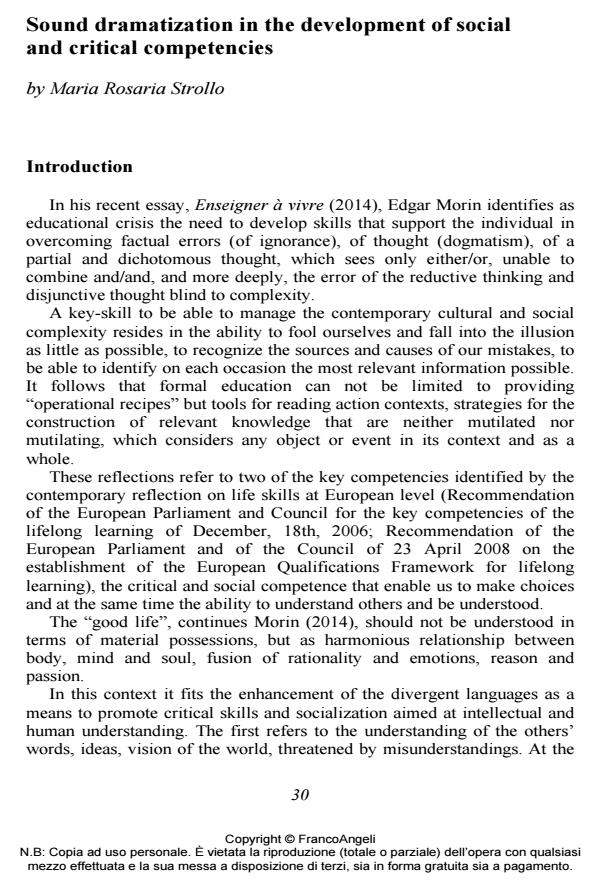Sound dramatization in the development of social and critical competencies
Titolo Rivista EDUCATIONAL REFLECTIVE PRACTICES
Autori/Curatori Maria Rosaria Strollo
Anno di pubblicazione 2016 Fascicolo 2016/1 Lingua Inglese
Numero pagine 15 P. 30-44 Dimensione file 175 KB
DOI 10.3280/ERP2016-001004
Il DOI è il codice a barre della proprietà intellettuale: per saperne di più
clicca qui
Qui sotto puoi vedere in anteprima la prima pagina di questo articolo.
Se questo articolo ti interessa, lo puoi acquistare (e scaricare in formato pdf) seguendo le facili indicazioni per acquistare il download credit. Acquista Download Credits per scaricare questo Articolo in formato PDF

FrancoAngeli è membro della Publishers International Linking Association, Inc (PILA)associazione indipendente e non profit per facilitare (attraverso i servizi tecnologici implementati da CrossRef.org) l’accesso degli studiosi ai contenuti digitali nelle pubblicazioni professionali e scientifiche
Starting from a reflection on the critical and social competencies, defined as key-skills in the current socio-cultural context, the paper analyzes the use of music and theater in training the trainers and presents a case of sound dramatization tested at the Laboratory of Educational Epistemology and Practices of the University of Naples Federico II
- Bertirotti, A., & Strollo, M.R. (Eds) (2007). Traghettare il pensiero. La musica come variabile “Caronte”. Milano: FrancoAngeli.
- Boal, A. (1979). The theatre of the Oppressed. New York: Urizen Books.
- Boal, A. (1992). Games for Actors and Non-Actors. New York: Routledge Press.
- Cady, E.T., Harris, R.J., & Knappenberger, J.B. (2008). Using music to cue autobiographical memories of different lifetime periods. Psychology of Music, 36 (2), pp. 157-178.
- Cambi, F. (2016). Formarsi tra le note. Roma: Anicia Editore.
- Demetrio, D., & Disoteo, M. (1995). Autobiografie musicali. In Piatti M. (a cura di). Io-tu-noi in musica: identità e diversità. Assisi: Pro Civitate Christiana.
- Demetrio, D. (2010), Scrivere per ricreare la propria immagine. Riflessioni sull’autobiografia come magnifica finzione. In E. Biffi, (a cura di), Scrivere altrimenti. Luoghi e spazi della creatività narrativa. Milano: Stripes (pp. 29-50).
- Holland, A.C., & Kensinger, E.A. (2010). Emotion and autobiographical memory. Physics of Life Reviews, 7, pp. 88-131.
- Mezirow, J. (2000). Learning as Transformation: Critical Perspectives on a Theory in Progress. San Francisco: Jossey-Bass.
- Morin, E. (2014). Enseigner à vivre: Manifeste pour changer l’éducation. Paris: ACTES SUD.
- Norman, V. P. (1995). The Power of Positive Thinking: the Original Personal Success Program. International center for Creative Thinking.
- Oliverio, A. (2003). La memoria autobiografica e la memoria collettiva. Adultità, 4.
- Pasticci, S. (2008). Parlare di musica. Roma: Meltemi Editore.
- Peretz, I. (2006). The nature of music from a biological perspective. Cognition, 100, pp. 1-32.
- Peretz, I. (2001). Listen to the brain: The biological perspective on musical emo- tions. In J.A. Sloboda, & P. Juslin, (Eds.). Music and Emotion: Theory and Research. Oxford: Oxford University Press (pp. 105-134).
- Pozzi, R. (2014). Educare alla complessità. Il ruolo della musica d’arte contemporanea. Musica Docta. Rivista digitale di Pedagogia e Didattica della musica, pp. 67-73.
- Recommendation of the European Parliament and Council for the key competencies pf the lifelong learning of December, 18th, 2006.
- Recommendation of the European Parliament and of the Council of 23 April 2008 on the establishment of the European Qualifications Framework for lifelong learning.
- Schlagman, S., & Kvavilashvili, L. (2008). Involuntary autobiographical memories in and outside the laboratory: How different are they from voluntary autobiographical memories?. Memory & Cognition, 36 (5), pp. 920-932.
- Sloboda, J.A., & Juslin, P. (Eds) (2001). Music and Emotion: Theory and Research. Oxford: Oxford University Press.
- Striano, M., Strollo, M.R., & Romano, A. (2014). The Theatre of the Oppressed: an Experiential Practice to Promote Transformative Learning? In Spaces of Transformation and Transformation of Spaces. New York Teachers College Columbia University, 23-26 October 2014, New York: Teachers College, Columbia University (pp. 693-699).
- Strollo, M.R. (2014). Scrivere l’autobiografia musicale. Dal ricordo volontario al ricordo spontaneo. Milano: FrancoAngeli.
- Strollo, M.R. (2015). Music, memory, autobiography: a pedagogical approach. In M.R. Strollo, & A. Romano (Eds.). Music, Emotions, Autobiographical Memory: an interdisciplinary approach. Napoli: Liguori (pp. 133-163).
- Strollo M.R., & Vittoria P. (2012a). A formação de educadores através de percursos estéticos: teatro, musica e narração. In VI Colloquio internacional de filosofia da educacao. filosofar: aprender e ensinar.Rio de Janeiro, 15-17/8/2012, pp. 1-14, Rio de Janeiro. http://uerj/maracanà.
- Strollo M.R., Vittoria P. (2012b). Educational policies of the Theater of the oppressed in the Universities of Naples and Rio de Janeiro. In Acta Universitatis Lucian Blaga. Iurisprudentia, Nr. 02/2012, Editura Universul Juridic, Bucureti (pp. 350-361).
- Taylor, E. (2010). Fostering Transformative Learning. In Mezirow, J., Taylor, E., & Associates (Eds.). Transformative Learning in Practice: Insights from Community, Workplace, and Higher Education, (pp. 3-17). San Francisco: Jossey-Bass.
- Varela, F. J. (1996). Neurophenomenology: A Methodological remedy to the hard problem. Journal of Consciousness Studies, 3(4), 330–349.
Maria Rosaria Strollo, Sound dramatization in the development of social and critical competencies in "EDUCATIONAL REFLECTIVE PRACTICES" 1/2016, pp 30-44, DOI: 10.3280/ERP2016-001004